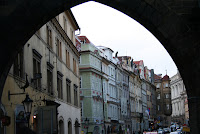
In these troubling times, we often prefer to divert our attention to suffering that is worthy of our time. So we track down stories about Africa, India, South Asia, the Middle East, and the urban slums of America to distract us from our own worries: the stock market, the size of the loss in our retirement fund now that there are so few fixed-benefit pensions around, whether our children will ever get decent jobs paying them living wages, will there be water to drink, air to breathe.
My cousin came out to visit yesterday. She is a few years older than I am and despite a difficult life--her mother died when she was eight years old after a long, five year bout with cancer, her father married a woman who insisted that she forget the family that was and pretend that her stepmother was indeed her biological mother and thus abandon her connections with her original family, she created an admirable life for herself. She married the first boy who liked her so that she could get out of the house. She finished college, she had a baby whom she adored and raised to be a gem of a man, she got a master's degree, and when she decided to leave her husband, she left with the ability to make a living for herself.
There isn't an ounce of self pity in my cousin's body. It just isn't permitted genetically. We share a grandmother and believe me, self-pity wasn't part of the family legacy. My cousin is tough.
But she is feeling blue. She had a plan: sell her second house in the Catskills, retire from her lucrative advertising job, sell her appreciated coop on the East Side, and move to the West Coast to be close to her married son, his wife, and their two children.
Then the stock market crashed. So she can't sell her second home, her 401(k) has tanked, and her one bedroom coop is unsaleable. She can't retire. At least for now.
It was in that frame of mind that we decided to see "I've Loved You So Long," by Phillippe Claudel, a French film, yes, there are subtitles, but having just returned from Europe, we can no longer isolate ourselves from other languages. Kristen Scott Thomas plays Juliette, just released from prison, who is reunited with her younger sister Lea played by Elsa Zylberstein, after fifteen years. This is a slow, human story about how sisters reconnect. Everyone, the probation officer and the social worker, reminds Juliette how lucky she is to have a family to return to after being in prison. But her silence, her coping mechanisms, her way of surviving not just imprisonment, but the crime she has committed become the elements of the plot of this slow, agonizing film about how hard it is to be around humans, and how secrets make these connections between us impossible.
This film has hope. It's not all despairing, and certainly Kristen Scott Thomas will be up for an Academy Award nomination for best actress. See it with someone with whom you want to have a deeply personal conversation afterwards. I did with my cousin, and it brought us closer together so that her disappointment that her plans had caved, and my general neurotic nature, blended into the human touch that we long for from family. Coincidentally, that is what this film is about, too.



























